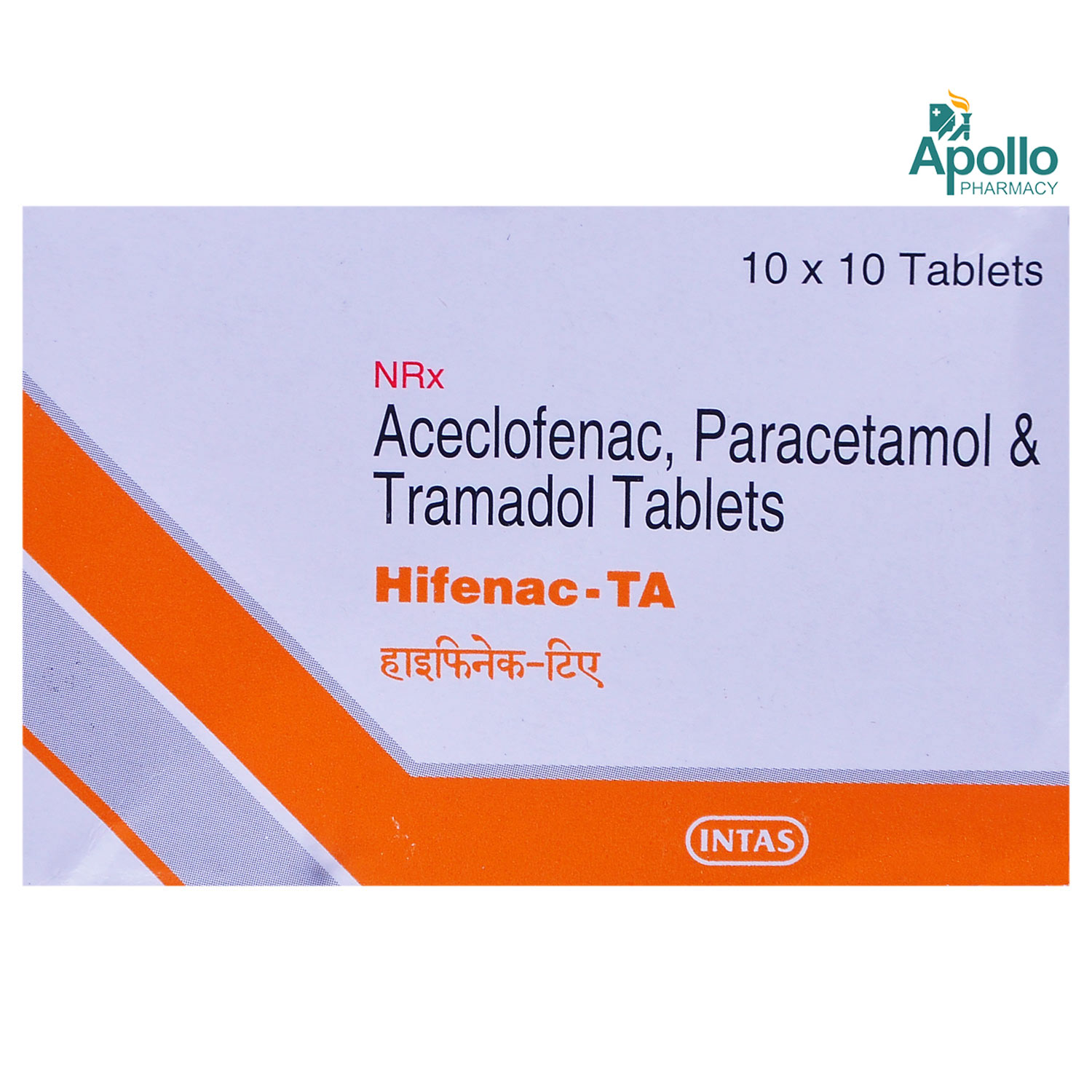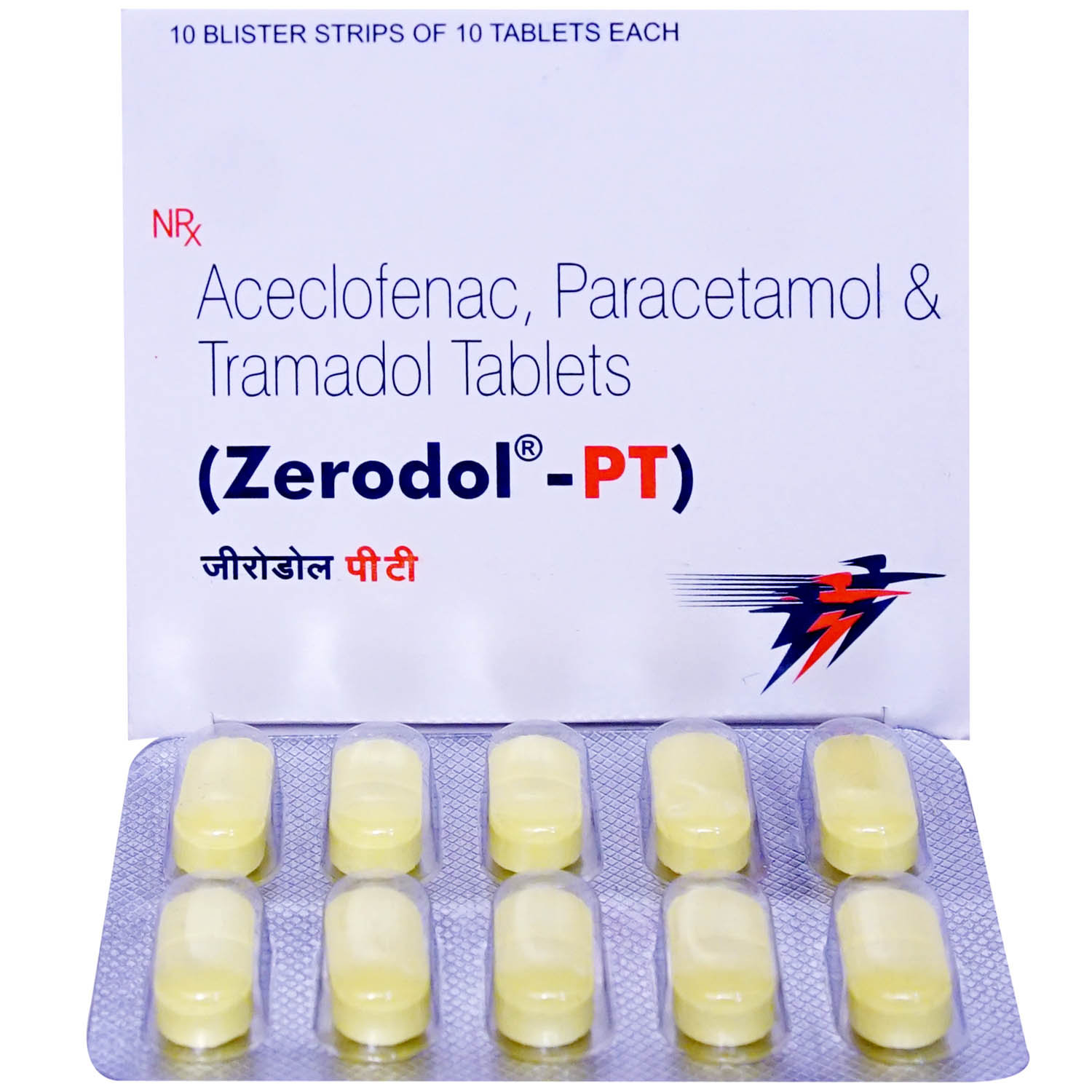Aceclofenac+paracetamol+tramadol
About Aceclofenac+paracetamol+tramadol
Aceclofenac+paracetamol+tramadol belongs to the class of analgesics and is used in the symptomatic treatment of moderate to severe pain. Pain can be temporary (acute) or long-lasting (chronic) in nature. Acute pain is induced for a brief period of time by injury to muscle, bone, or other organ tissues. While chronic pain lasts for a long duration and is caused due to pathologies like nerve damage, osteoarthritis, etc.
Aceclofenac+paracetamol+tramadol contains Aceclofenac, Paracetamol, and Tramadol. Aceclofenac is a non-steroidal antiinflammatory drug (NSAID). Paracetamol is a common pain killer and has an antipyretic effect (reduces fever), whereas Tramadol is an opioid analgesic. Aceclofenac and Paracetamol both work by blocking the release of certain chemical messengers in the brain that cause pain. Tramadol is an opioid analgesic (a very strong pain reliever) that works by blocking the transmission of pain signals to the brain to lower pain perception.
Aceclofenac+paracetamol+tramadol can be taken with or after the meal. If stomach upset or irritation occurs, it is advisable to take Aceclofenac+paracetamol+tramadol with food or milk. It should be swallowed whole with a glass of water. People taking Aceclofenac+paracetamol+tramadol may experience Nausea, Vomiting, Anxiety, Stomach pain, Indigestion, Loss of appetite, Dryness in the mouth, Dizziness, Sleepiness, and Heartburn. However, all patients may not develop the same side effects. Inform your doctor if you notice any abnormal side effects. Stop taking this medicine and consult a doctor immediately if you experience symptoms like tightness of the chest, breathing difficulties, fever, skin rashes, increased heart rate, and or in case of any signs of hypersensitivity.
Before taking Aceclofenac+paracetamol+tramadol, inform your doctor if you have any known allergies to tramadol, paracetamol, or any other medications, foods, or herbal supplements. Ask the doctor if it is safe to use in children below 12 years, pregnant women, and breastfeeding mothers. It is advisable not to exceed the recommended dose or duration of treatment. Inform your doctor if you have liver or kidney disease, severe heart failure, and epilepsy.
Uses of Aceclofenac+paracetamol+tramadol
Medicinal Benefits
Aceclofenac+paracetamol+tramadol plays a vital role in reducing pain and inflammation by blocking the release of chemical substances which cause pain and fever. Aceclofenac+paracetamol+tramadol relieves pain and inflammation in arthritic conditions with the benefit of increased antibiotic penetration and flow of blood at the injury site. Paracetamol can produce less gastric irritation compared to other painkillers like aspirin. So, it is well-tolerated in mostly all age groups.$ name in combination has a faster onset of action and provides quick relief from the pain, and it is also prescribed for the conditions like fever and arthritis.
Directions for Use
Storage
Side Effects of Aceclofenac+paracetamol+tramadol
- Nausea
- Vomiting
- Stomach pain
- Indigestion
- Loss of appetite
- Dryness in the mouth
- Dizziness
- Sleepiness
- Heartburn
- Euphoria
- Slurred speech
- Liver toxicity
- Numbness or tingling
Drug Warnings
Consumption of alcohol should be avoided during the treatment with Aceclofenac+paracetamol+tramadol as it may increase the risk of liver damage. Patients with stomach ulcers, gastric bleeding, severe heart failure, and liver or kidney disease should not take Aceclofenac+paracetamol+tramadol on their own. Besides this, it should be avoided during the last trimester of pregnancy unless there are compelling reasons for doing so. If you have a severe allergy to painkillers like asthma, rhinitis, angioedema (swelling under the skin), or skin rashes, immediately stop taking Aceclofenac+paracetamol+tramadol. Maintain caution when driving or operating machinery.
Drug Interactions
Drug-Drug Interaction: Aceclofenac+paracetamol+tramadol may interact with pain medications (such as nimesulide, metamizole, pentazocine, naltrexone), monoamine oxidase inhibitors (MAO) (such as phenelzine, rasagiline, Barbiturates (Phenobarbitone)), HIV drugs (ritonavir), blood clotting agents (warfarin) should not be taken with Aceclofenac+paracetamol+tramadol as it can worsen your condition.
Drug-Food Interaction: No interaction found.
Drug-Disease Interaction: People with peptic ulcers, gastric bleeding, severe heart failure, kidney and liver diseases, and high blood pressure should avoid intake of Aceclofenac+paracetamol+tramadol as it may lead to life-threatening conditions.
Drug-Drug Interactions Checker List:
Safety Advice

Alcohol
unsafeTaking excessive alcohol with Aceclofenac+paracetamol+tramadol can cause liver damage. So, it is advisable to avoid or limit intake of alcohol during the treatment with Aceclofenac+paracetamol+tramadol.

Pregnancy
cautionAceclofenac+paracetamol+tramadol can have harmful effects on pregnancy. If you are pregnant, consult your doctor before taking this medicine. See medical advice if you become pregnant while on treatment with Aceclofenac+paracetamol+tramadol.

Breast Feeding
cautionIf you are breastfeeding, you may experience some harmful effects of Aceclofenac+paracetamol+tramadol. In case you experience any of these, discontinue its use until you consult your doctor.

Driving
cautionAvoid driving or operating heavy machinery after taking Aceclofenac+paracetamol+tramadol as you may feel sleepy.

Liver
cautionThe liver can be affected by Aceclofenac+paracetamol+tramadol. If you experience any unwanted effects of this drug, stop taking it and consult your doctor. You should restart Aceclofenac+paracetamol+tramadol only after medical advice.

Kidney
cautionAceclofenac+paracetamol+tramadol rarely may affect kidneys. If you experience unwanted symptoms while using this medicine, seek medical advice.

Children
cautionAceclofenac+paracetamol+tramadol should not be administered to children unless a child expert has prescribed it. The dose of the medication will be determined by your doctor based on your child's weight and the severity of the problem.
Habit Forming
Diet & Lifestyle Advise
- Do not go for heavy exercise as it may increase your joint pain in arthritis. Instead, you can do stretching and low-impact aerobic exercises like walking on a treadmill, bike riding, and swimming. You can also strengthen your muscle strength by lifting light weights.
- In a chronic condition of arthritis or joint pain, try to include fish like salmon, trout, tuna, and sardines. These fishes are enriched with omega-3 fatty acids that have a minimum level of chemicals called cytokines, which ramp up inflammation.
- Your sitting posture is important, especially when you have pain and inflammation condition. Try to sit as little as possible and only for a short time (10-15 min). Use back support like a rolled-up towel at the back of your curve to minimize pain. Keep your knees and hips at a right angle. Besides this, you can use a footrest if required.
- Do not take alcohol.
- Take adequate rest whenever required.
- Avoid driving or operating heavy machinery.
Special Advise
- Aceclofenac+paracetamol+tramadol should not be stopped without a doctor’s advice. Abrupt stopping may cause withdrawal symptoms such as nervousness, mood disturbances, hallucinations, suicidal thoughts, muscle aches, diarrhea, and nausea.
- The components of Aceclofenac+paracetamol+tramadol have the tendency to cause stomach upset. Thus, it is recommended to consume Aceclofenac+paracetamol+tramadol with meals to minimize gastric side effects. If you have a diagnosis of peptic ulcer, Aceclofenac+paracetamol+tramadol is best avoided unless prescribed by your doctor.
Patients Concern
Disease/Condition Glossary
Pain: It can be temporary (acute) or lifelong (chronic) in nature. Acute pain is induced for a brief period of time by injury to muscle, bone, or organ tissues. Chronic pain is caused by nerve damage, osteoarthritis, and dental discomfort caused by tooth nerve damage, infection, decay, extraction, or injury. Soft tissue (muscle, tendon, and ligament) damage causes several forms of musculoskeletal discomfort. Extreme tissue pain and inflammation caused by sprains, strains, trauma, or post-surgery can take a long time to recover.
FAQs
Your doctor decides the dose and duration of the medicine depending on your health condition. In general, it is not used for more than five days, as prolonged usage may lead to dependence.
Aceclofenac+paracetamol+tramadol, when taken by patients who are allergic to painkillers or NSAIDs, can be harmful. It should also be avoided in a person with a history of heart failure, kidney or liver disease, and stomach ulcers.
No. Aceclofenac+paracetamol+tramadol is not indicated for stomach pain. If you have stomach pain, refer to the doctor, as it may be a sign of stomach ulcer or gastric bleeding.






